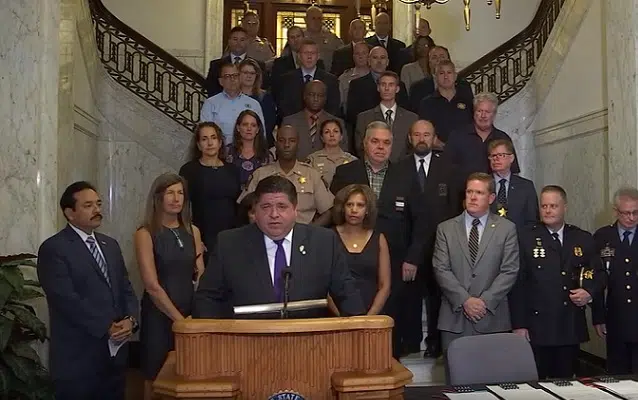(Springfield)- On First Responder Day at the Illinois State Fair, Governor JB Pritzker signed a package of legislation and two executive orders to support public safety and first responders the Illinois State Police headquarters in Springfield.
The executive orders and new laws support first responders’ mental health and wellness, children and spouses of fallen police officers and survivors of sexual assault, as well as ensure that the Illinois State Police are operating effectively and represent the makeup of the state.
“The measures I signed today build on the work we’ve done this year to better serve those who work in public safety,” said Governor JB Pritzker. “Together, these initiatives move us closer to a holistic criminal justice system, one that protects law enforcement, honors public servants, respects victims, and allows the people of Illinois to go about their lives with a renewed sense of safety, justice and hope.”
House Bill 124
House Bill 124 expands the Illinois State Police’s hiring requirements to diversify their applicant pool and ensure that state troopers reflect Illinois’ residents. With the bachelor’s degree requirement being an impediment to achieving diversity in the ranks, this new law now requires either an associate degree or 60 credit hours from an accredited college or university in order to enter the Illinois State Police Academy. HB 124 takes effect immediately.
“Our state troopers work extremely hard to keep Illinois citizens safe,” said Sen. Iris Martinez (D-Chicago). “This law will make it easier for those who are passionate about the work to join the Illinois State Police while also making sure all applicants are qualified.”
“State Troopers are an important line of defense in keeping our families and communities safe,” said Rep. Luis Arroyo (D-Chicago). “It is important that people who wish to serve the public are empowered to do so and not held back by barriers that weaken public safety. This law will help the state police find the next generation of officers who will protect our neighborhoods for years to come. I want to thank Governor Pritzker for showing his commitment to law enforcement by signing this bill.”
House Bill 2766
House Bill 2766 establishes a peer support program for all first responders, with a focus on wellness and suicide prevention. The new law also creates the bipartisan First Responder Suicide Prevention Task Force, which is comprised of legislators from both parties, officials representing fire fighters and law enforcement and mental health providers. The task force will submit its report to the General Assembly by January 1, 2020. HB 2766 takes effect immediately.
“The men and women who dedicate their lives to the protection of their neighbors do so under extremely stressful situations that few others can truly understand,” said Sen. Terry Link (D-Indian Creek). “Ensuring there are services available when needed shows our brave first responders that even if they face these tough working conditions, they aren’t alone.”
“I have family members, friends and neighbors who are first responders. They face things every day that most of us will not see in our lifetime. HB 2766 is legislation to help those that help us,” said Rep. Fran Hurley (D-Chicago). “I was honored to work with our city and state first responders, Senators Link and Cunningham and others to bring this bill into law. Thank you, Governor Pritzker.”
Senate Bill 1183
Senate Bill 1183 expands the scope of the Police Memorial Committee Fund to include scholarships or grants to children and spouses of police officers killed in the line of duty. The Illinois Police Officers Memorial Committee was first established in 1985, and its monument in Springfield bears the names of the officers who have made the ultimate sacrifices while serving their communities. SB 1183 becomes effective immediately.
“Spouses of fallen officers often need to restructure their lives after their loved one is gone,” said Sen. Tony Munoz, a former Chicago police officer. “These scholarships provide support for spouses figuring out how to move forward after such a tragic loss.”
“I’m proud to have joined Senator Munoz in sponsoring this bill that the Governor signed into law today so that the Police Memorial Committee can help the families of fallen officers in two new ways,” said Rep. John Connor (D-Lockport). “First, to help defray education expenses for the spouses of fallen police officers, in addition to their children. Currently, the committee can only fund scholarships for the children of fallen officers, but a spouse also needs to further their education to be able to support a family that has made the ultimate sacrifice. Second, to help defray the costs of summer camps, as well as education, for the children of fallen officers. In particular, a summer camp specifically for these children has been found to be an amazing comfort to these families, and this legislation permits the committee to assist with the costs of that camp. This was common-sense legislation to support our police officers and their families, particularly those that have undertaken the heaviest loss.”
Senate Bill 1411
Senate Bill 1411 provides sexual assault victims with more transparency on the status of the processing of rape kit evidence. The new law creates a real-time electronic tracking system for evidence processing in cases of sexual assault. The statewide system will be hosted online, have a 24-hour help desk, make law enforcement agency contact information available to victims and provides real-time entry and updates of information. The new law is a result of the Sexual Assault Evidence Tracking and Reporting Commission. SB 1411 goes into effect immediately.
“Illinois currently lacks a uniform system across all law enforcement to track sexual assault evidence,” said Sen. Dan McConchie (R-Hawthorn Woods). “No one who has been sexually assaulted should be left in the dark while the evidence is being processed. This new law will allow survivors to access real-time status updates. This is just the first step in providing transparency for victims, ensuring survivors are treated with the seriousness they deserve, and bringing more offenders to justice.”
“Today’s bill signing is the best ending for my three-year journey,” said Rep. Margo McDermed (R-Mokena). “With bipartisan support from the legislature and recommendations from all the members of our study commission, victims of sexual assault will now be able to track their kits through the system.”
Senate Bill 1915
Senate Bill 1915 updates the organizational structure of the Illinois State Police Divisions. An ISP initiative, state law will now reflect the divisions and offices within ISP with the specific rights, duties, and powers pursuant to statue that had not been accurate for the last 15 years. SB 1915 takes effect on January 1, 2020.
“The Department of Justice Services fulfills an important role for our State Police and deserves a name that reflects the work they do,” said Rep. Anne Stava-Murray (D-Naperville). “It’s critical we continue to modernize our policing statues to fit our state as it evolves.”
Executive Order 2019-12 Reorganizing Divisions Within the Department Of State Police
Executive Order 2019-12 builds on the legislative restructuring of the Illinois State Police, allowing the organization’s leadership to streamline its role in the criminal justice system. It establishes distinctive divisions within ISP and delineates their powers, duties, rights and responsibilities so the Illinois State Police can better serve the people of Illinois.
Executive Order 2019-13 Establishing the Governor’s Task Force on Forensic Science
Executive Order 2019-13 establishes a Forensic Science Task Force to tackle the backlogs at our crime processing laboratories and deliver proper justice. It will analyze the operations and oversight of the critical laboratories and ensure they use the latest forensic technologies to solve crimes and protect the public. Chaired by the Director of the State Police, the task force will report to the governor and General Assembly by June 1, 2020.






